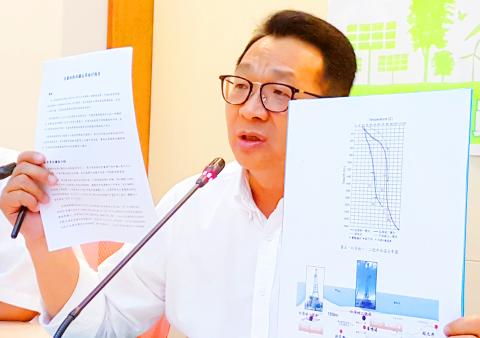The government should include geothermal energy development in the Forward-looking Infrastructure Development Program budget because resuming construction of the Fourth Nuclear Power Plant is not the way to address the nation’s electricity shortage, Democratic Progressive Party (DPP) Legislator Chen Ou-po (陳歐珀) said yesterday.
“We should use the next eight years to develop ‘green’ energy, which should be the only option,” he said.
President Tsai Ing-wen (蔡英文) has vowed to make Taiwan free of nuclear power plants by 2025 and make Yilan County’s geothermal energy plant operational by 2020, he said.

Photo: Chu Pei-hsiung, Taipei Times
Ministry of Economic Affairs officials told the 2015 National Energy Conference that the nation’s geothermal energy reserve is equivalent to 11.8 times the total electricity that could be generated by the Fourth Nuclear Power Plant, the lawmaker said.
A study by the National Science Council conducted in 2010 and 2011 found that the geothermal energy reserve in Yilan County — particularly from Cingshuei (清水) to Touchang (土場), Longde (龍德) to Lize (利澤) and Sansing (三星) and Jiaosi (礁溪) townships — can generate as much electricity as two-and-a-half nuclear power plants, Chen said.
Geothermal energy would be a safe energy source and help reduce the nation’s carbon emissions, he added.
However, the “green” energy projects listed in the infrastructure program do not include geothermal ones, he said.
Yilan County began developing geothermal energy in Cingshuei 30 years ago, he said, adding that Taiwan would have become a nation known for its geothermal energy industry if the government at the time had invested in geothermal power plants rather than nuclear energy, he said.
The Philippines has seven geothermal fields and 18 geothermal power plants, and is the world’s second-largest producer of such energy, while 15 percent of its power supply comes from geothermal power plants, he said.
“Taiwan and the Philippines are both on the Ring of Fire in the Pacific Ocean, in which earthquakes and volcanic eruptions happen frequently,” Chen said.
“Taiwan has not generated any geothermal energy and has trailed behind the Philippines in this regard for 30 years,” he said.
The government should increase its investment in geothermal energy because technological advances have given the field a good chance of success, he said.
It has already taken the first step by signing a contract with the Cingshuei Geothermal Power Plant to reactivate production there and the plant plans to expand production to 4 megawatts in four years, which could supply electricity to 28,000 households, Chen said.
Although the Ministry of Technology plans to spend NT$400 million (US$13.2 million) on a two-year project to drill excavation wells in Sansing Township, Chen said that only NT$198 million has been approved.
It needs to provide the rest of the funds quickly to facilitate the excavation efforts, he said.

A preclearance service to facilitate entry for people traveling to select airports in Japan would be available from Thursday next week to Feb. 25 at Taiwan Taoyuan International Airport, Taoyuan International Airport Corp (TIAC) said on Tuesday. The service was first made available to Taiwanese travelers throughout the winter vacation of 2024 and during the Lunar New Year holiday. In addition to flights to the Japanese cities of Hakodate, Asahikawa, Akita, Sendai, Niigata, Okayama, Takamatsu, Kumamoto and Kagoshima, the service would be available to travelers to Kobe and Oita. The service can be accessed by passengers of 15 flight routes operated by

Alain Robert, known as the "French Spider-Man," praised Alex Honnold as exceptionally well-prepared after the US climber completed a free solo ascent of Taipei 101 yesterday. Robert said Honnold's ascent of the 508m-tall skyscraper in just more than one-and-a-half hours without using safety ropes or equipment was a remarkable achievement. "This is my life," he said in an interview conducted in French, adding that he liked the feeling of being "on the edge of danger." The 63-year-old Frenchman climbed Taipei 101 using ropes in December 2004, taking about four hours to reach the top. On a one-to-10 scale of difficulty, Robert said Taipei 101

MORE FALL: An investigation into one of Xi’s key cronies, part of a broader ‘anti-corruption’ drive, indicates that he might have a deep distrust in the military, an expert said China’s latest military purge underscores systemic risks in its shift from collective leadership to sole rule under Chinese President Xi Jinping (習近平), and could disrupt its chain of command and military capabilities, a national security official said yesterday. If decisionmaking within the Chinese Communist Party has become “irrational” under one-man rule, the Taiwan Strait and the regional situation must be approached with extreme caution, given unforeseen risks, they added. The anonymous official made the remarks as China’s Central Military Commission Vice Chairman Zhang Youxia (張又俠) and Joint Staff Department Chief of Staff Liu Zhenli (劉振立) were reportedly being investigated for suspected “serious

Taiwanese and US defense groups are collaborating to introduce deployable, semi-autonomous manufacturing systems for drones and components in a boost to the nation’s supply chain resilience. Taiwan’s G-Tech Optroelectronics Corp subsidiary GTOC and the US’ Aerkomm Inc on Friday announced an agreement with fellow US-based Firestorm Lab to adopt the latter’s xCell, a technology featuring 3D printers fitted in 6.1m container units. The systems enable aerial platforms and parts to be produced in high volumes from dispersed nodes capable of rapid redeployment, to minimize the risk of enemy strikes and to meet field requirements, they said. Firestorm chief technology officer Ian Muceus said